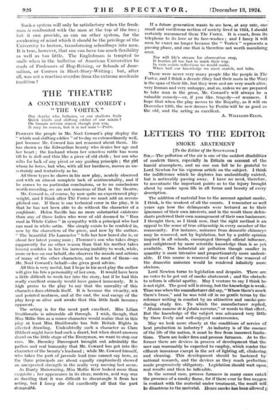THE THEATRE
A CONTEMPORARY COMEDY : " THE VORTEX "
Our depths who fathoms, or our shallows finds Quick whirls and shifting eddies of our minds ? On human actions reason though you can, It may be reason, but it is not man !—Porn.
PEauers the people in Mr. Noel Coward's play display the " whirls and shifting eddies " of to-day so extraordinarily well, just because Mr. Coward has not reasoned about them. He has shown us the Edwardian beauty who denies her age and her heart ; the husband whom her senseless rattle has worn till he is dull and thin Iike a piece of old cloth ; her son who wilts for lack of any pivot or any guiding principle ; the girl whom he loves, but who, with all her hardness, moves as un- certainly and tentatively as he.
All these types he shows in his new play, acutely observed and with an almost complete lack of sentimentality, and if he comes to no particular conclusions, or to no conclusions worth recording, we are not conscious of that in the theatre. Mr. Coward is, of course, by now quite an experienced play-
wright, and I think after The Vortex we must add an accom- plished one. If there is one technical error in the play, it is that he has not been able to do without the character of a confidante. Helen Saville has no more substantial existence than any of those ladies who were of old doomed to " Run mad in White Calico " in sympathy with a principal who had run mad in white satin. She simply exists to be confided in, now by the characters of the piece, and now by the author. " The beautiful Flo Lancaster " tells her how bored she is, or about her latest young man ; Florence's son who takes drugs
(apparently for no other reason than that his mother takes lovers) confides in her his increasing inability to work, while, more or less on our behalf, she observes the moods and actions of many of the other characters, and to most of them—on Mr. Noel Coward's behalf—she gives good advice.
All this is very useful, but I hope in his next play the author will give his Iris a personality of her own. It would have been a little difficult to work her into the story, but if he had this really excellent comedy would have gained immensely. It is high praise to the play to say that the unreality of this character does obtrude itself. It is because the vivacity, wit and pointed neatness, and at the end, the real energy of the play keep us alive and awake that this little fault becomes apparent.
The acting is for the most part excellent. Miss Lilian Braithwaite is admirable all through. I wish, though, that Miss Millie Sim an a minor character would realize that in this play at least Miss Braithwaite has Sole British Rights in affected drawling. Undoubtedly such a character as Clare Hilbert might have had such a drawl, but when drawl answers drawl on the little stage of the Everyman, we want to stop our ears. Mr. Bromley Davenport brought out admirably the pathos and real humanity that Mr. Coward has got into the character of the beauty's husband ; while Mr. Coward himself, who takes the part of juvenile lead (one cannot say hero, as the three principals are about equally emphasized) showed an unexpected strength in the really very moving last scene.
As Bunty Mainwaring, Miss Mollie Kerr looked more than exquisite ; her appearance in its clear, modern, acid way was so dazzling that it was difficult to disentangle it from her acting, but I fancy she did excellently all that the part demanded. If a future generation wants to see bow, at any rate, one
small and vociferous section of society lived in 1924, I should; certainly recommend them The Vortex. it is exact, from its:
telephone to its love or its face-washes ; and I fancy it will. soon be exact no longer because the " Vortex " represents al passing phase, and one that is therefore not worth moralizing: over.
Nor will life's stream for observation stay, It hurries all too fast to mark their way. In vain sedate reflections we would make, When half our knowledge we must snatch, not take.
There were never very many people like the people in The' Vortex, and I think a decade (they had their roots in the War)) is the span of their life, but they were and are very much alive, very human and very unhappy, and so, unless we are prepared to take man in the gross, Mr. Coward's will always be a valuable comedy—or, if you like, tragedy—of manners. I
hope that when the play moves to the Royalty, as it will on December 15th, the new dresses by Poulin will be as good as the old, and the acting as excellent. A. Wikriams-Erms.


























































 Previous page
Previous page